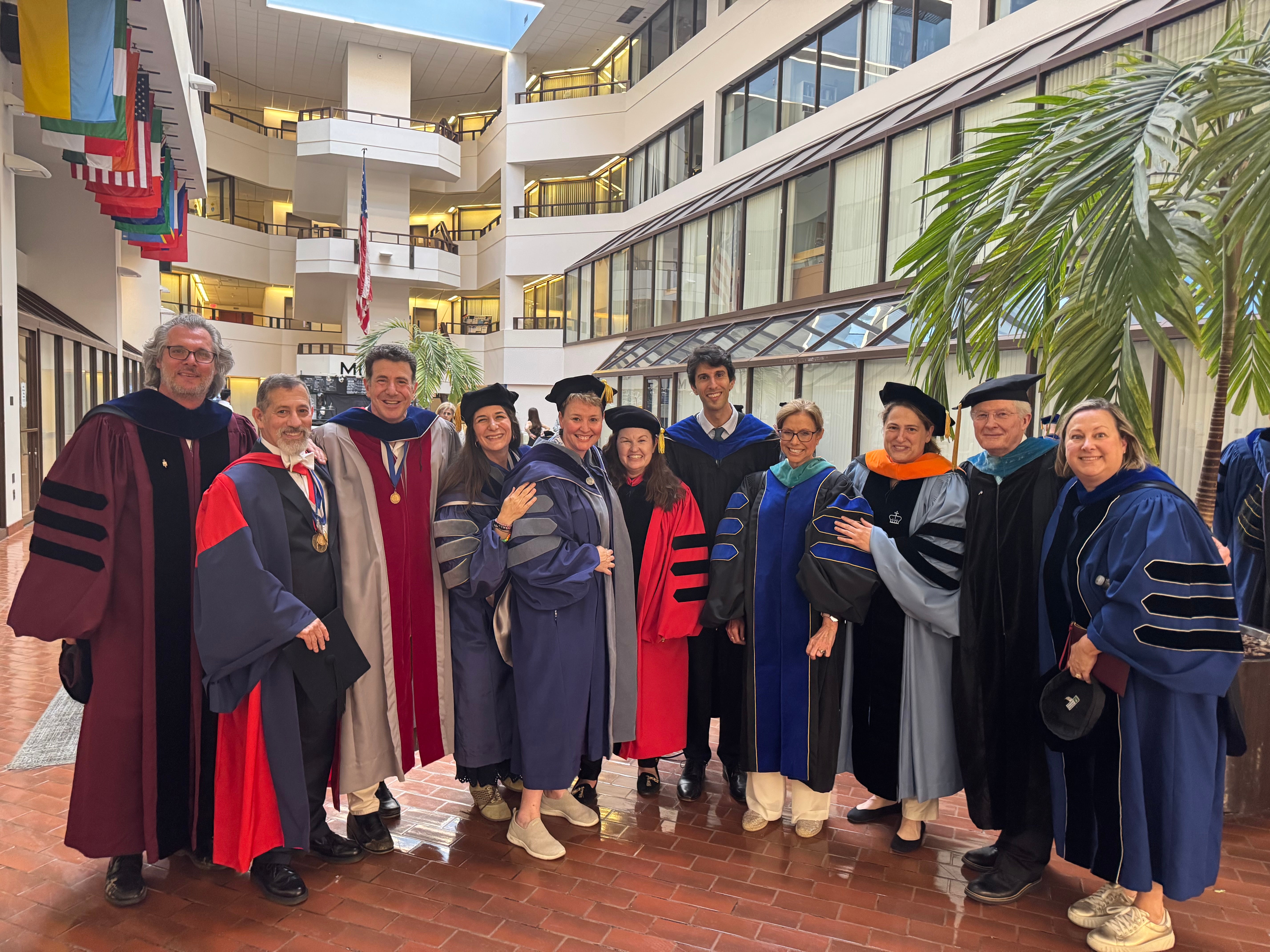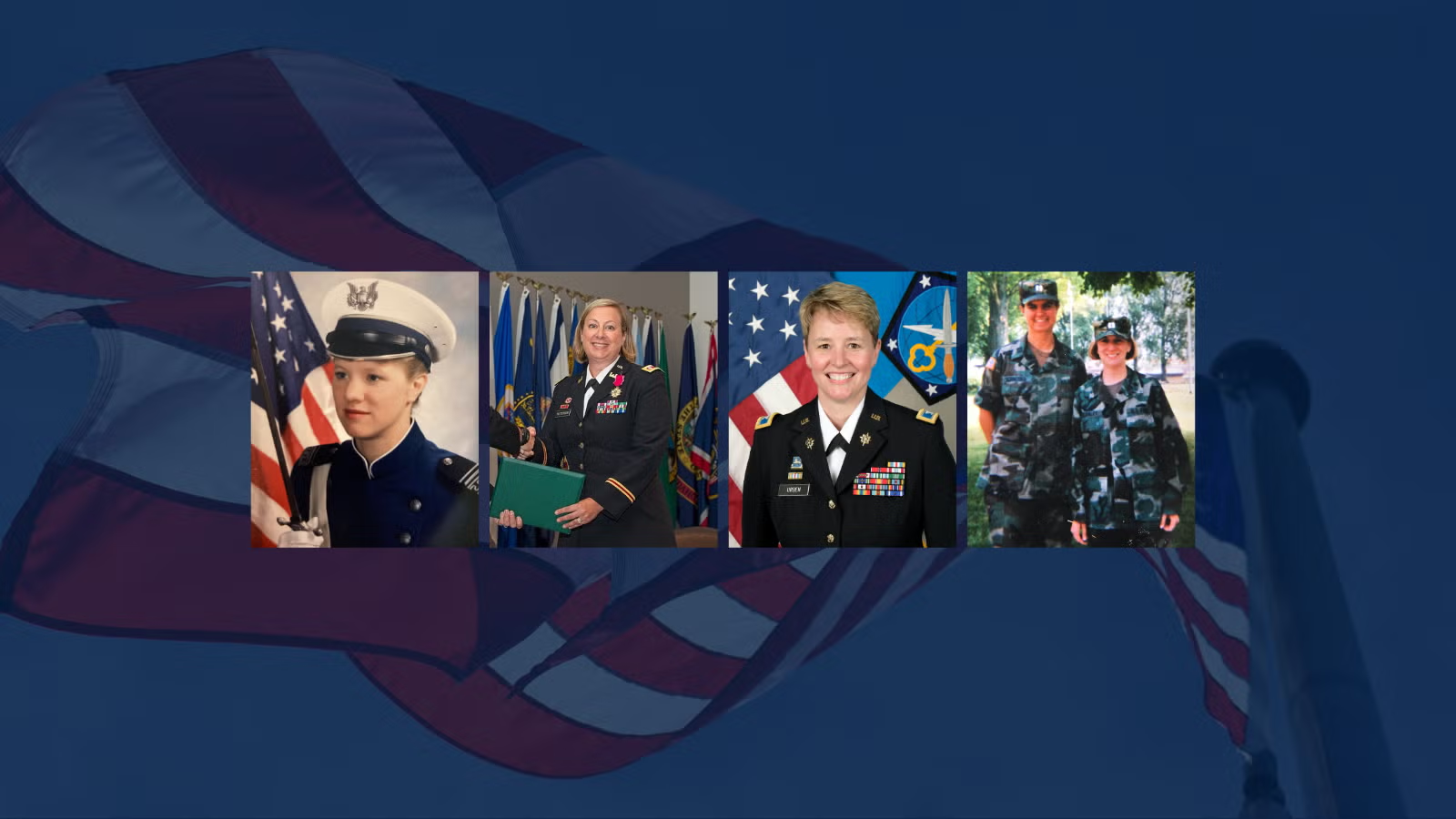Each year on November 11, the United States honors its military veterans for their service to our country for the common good. The School of Foreign Service is proud to recognize and celebrate the contributions of some of our own faculty veterans: Professors Rebecca Patterson, Elizabeth Stanley, Heidi Urben and Jodi Vittori. Through their leadership in the Security Studies (SSP) and Master of Science in Foreign Service (MSFS) programs, they exemplify how military service aligns with shaping impactful educators, policymakers and thought leaders.
In honor of Veterans Day 2025, they’ve shared with us stories from active duty, insights from their careers as scholar-practitioners and thoughts on how they bring their military experiences to the classroom.
Duty, discipline and discovery across borders
For Professor Rebecca Patterson, director of the Center for Security Studies and Security Studies Program (SSP), her journey to the military was driven by a desire to be a part of something bigger than herself. Growing up in Grosse Pointe, Michigan, she graduated from the United States Military Academy at West Point and was commissioned a second lieutenant in the U.S. Army as an engineer officer.
“In my first role as an engineer platoon leader, I deployed to Thailand, where I oversaw the construction of a school in a tiny village; a heliport complex near Laredo, Texas, for the U.S. Border Patrol; and a training facility for the New York Police Department,” Patterson recalls. “My time in South Korea, where I lived a few miles from the demilitarized zone (DMZ), was spent preparing for a potential war with North Korea—tasks that would include emplacing obstacles, digging survivability positions and evacuating civilians.”
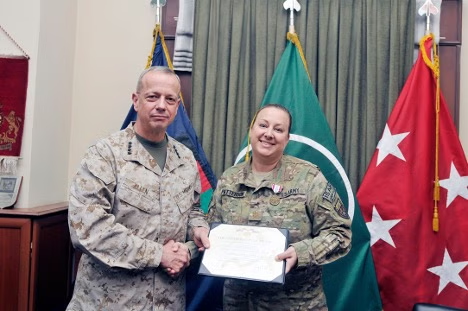
Patterson spent 22 years in uniform before retiring. Looking across her extensive military service, she shares that her work in Afghanistan was among the most rewarding and intellectually challenging of her career. Working directly for SSP alumnus General John Allen (SSP’83) of the U.S. Marine Corps in his Commander’s Initiatives Group, she recalls: “In that role I had a firsthand view of the challenges and opportunities of coalition warfare, the intersection of strategy and policy, how tactical events could have strategic impacts and the importance of civil-military relations.”
Like Patterson, Professor Jodi Vittori also found that military service offered both challenge and purpose while shaping her understanding of global affairs. Vittori, concentration co-chair for global politics and security in the Master of Science in Foreign Service Program, spent much of her childhood as a “military brat,” moving around every few years before joining the Air Force Academy when she was just 17 years old. Initially enticed by an education filled with jumping out of aircraft, undertaking survival training and travelling the world, she learned to foster an ethos of service before self.
Having served for 20 years in the U.S. Air Force as an intelligence officer, Vittori’s global postings and duty stations not only helped shape her worldview but continue to inform her academic interests in understanding foreign policy and its intersections with governance, corruption, development and security.
“Observing how poorly governed countries preyed upon and impoverished their own citizens furthered my commitment to the importance of democracy and the rule of law.”
Professor Jodi Vittori

She continues: “Peacekeeping duty in Sarajevo, Bosnia-Herzegovina from 2000 to 2001 probably had the greatest impact on my future career at Georgetown University. Part of my duty there was to track the ethnicity-related violence that continued to plague the country after the 1995 Dayton Peace Accords,” Vittori recalls. “I saw how various ethnic leaders extorted and attacked the members of their own ethnic groups as well as other ethnic groups. At the same time, many of these ethnic leaders were running criminal rackets, often engaging in organized crime with the very groups they claimed to be fighting against. The role of profit for these leaders in keeping the conflict going was hard to miss.”
And Vittori’s research interests have led to some interesting outcomes: “I’m officially banned from Russia, presumably due to my research on how corrupt regimes—including that of Russia’s President Vladimir Putin—hide their money.”
Reflecting on her time in uniform, Vittori says: “Military deployments to places as diverse as the Korean Peninsula, Iraq, Afghanistan and the Balkans led me to appreciate the role that the quality of governance plays in national security, economic development, media and culture as well as responses to environmental issues like pollution and climate change.”
Intersection of service and scholarship
The transition from service to scholarship can represent not an endpoint but an evolution of mission—a way to translate lived experience into learning. Professor Heidi Urben, associate director of the Security Studies Program, embodies this connection. Urben served for more than 23 years as a military intelligence officer on active duty in the U.S. Army before retiring at the end of 2020. Like Vittori, Urben also grew up as a military brat, born in Hawaii and frequently moving to follow her father’s career as a U.S. Army officer.
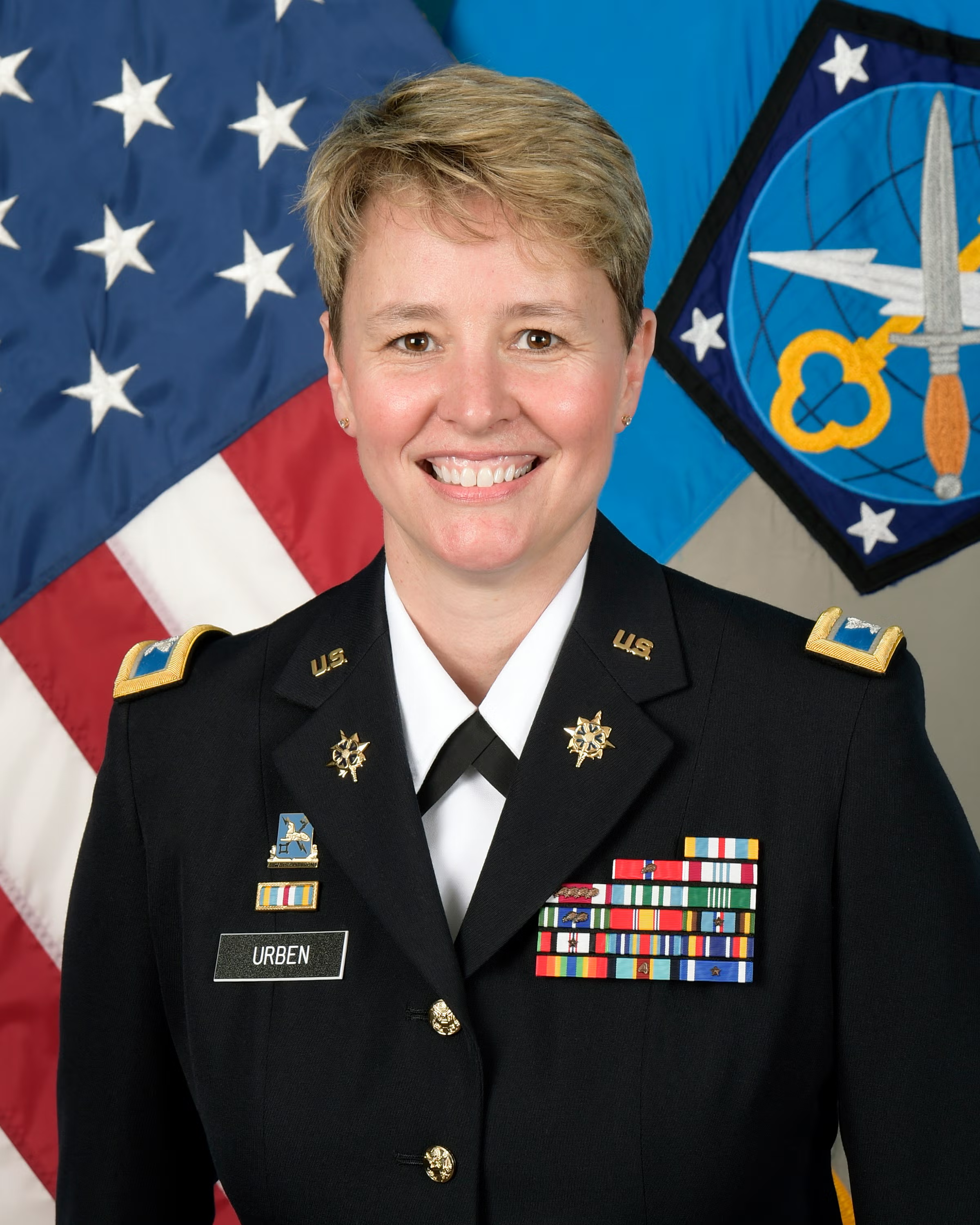
The reasons why someone joins the military are frequently found close to home, according to Urben: “It’s common for children of service members to follow in their parents’ footsteps and join the military, and that explains some of why I was motivated to serve in the Army. Another very practical aspect was that I paid for most of my college tuition through an ROTC scholarship to attend Notre Dame. It’s quite common that people join for material benefits but end up staying for non-material reasons, and that certainly explains my experience. As a 21-year-old second lieutenant, I never had any aspirations of making the Army a career, but I found the work rewarding and important and enjoyed the people I served with.”
For her, the opportunity to teach at Georgetown felt like coming home. She completed a Master of Policy Management in 2006 and a Ph.D. in government in 2010.
“The core Jesuit values of educating the whole person and encouraging reflection have always been important to me, but they’ve only grown in importance since being on the other side of the classroom.”
Professor Heidi Urben
She explains that her research on civil-military relations norms “in turn, informs those serving in the military today.”
Like Urben, Professor Elizabeth Stanley from the Center for Security Studies also bridges personal experience and academic inquiry. For her, the military is not only a profession, but also part of a long family lineage—she can trace her family’s history of service in the U.S. Army all the way back to the Revolutionary War. After a ROTC scholarship at Yale, Stanley served as a U.S. Army intelligence officer in South Korea, Germany and on two UN and NATO peacekeeping deployments in the Balkans.
She carries this family legacy and her real-world experience into her scholarship. Her first book, Paths to Peace, about the domestic politics of war termination, focuses on the Korean War, where her grandfather fought during the stalemated “war of the hills” in 1952. She became fascinated with that war while stationed there herself in 1993. Her path wasn’t without obstacles, however, and Stanley draws on her first-hand encounters with stress and trauma in the military to inform her more recent work.
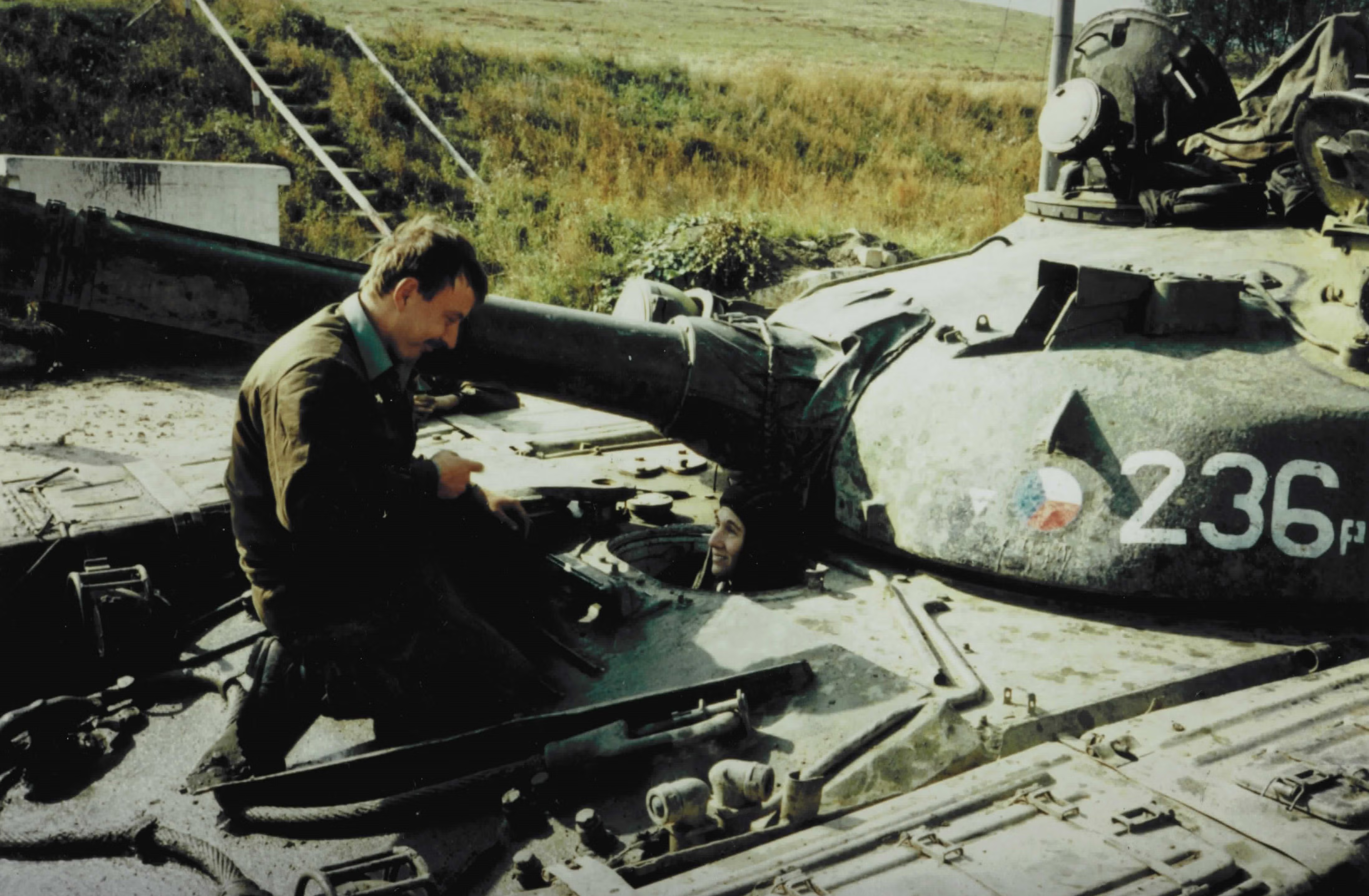
“Perhaps a quirk of the post-Cold War military drawdown, I always filled positions intended for someone more senior, often by two ranks—an experience gap that was quite challenging,” Stanley says. “In addition to intensive military training and deployments, I needed resuscitation from a near-death experience when I first arrived in Bosnia in early 1996. I also experienced sexual harassment while on active duty, as well as command reprisal after reporting it. That reprisal eventually led me to resign my active-duty commission. All these events complicated my transition to life as a graduate student, especially because I felt so isolated on campus.”
The challenges she faced during that period became the foundation for her later research and practice. Stanley developed Mindfulness-based Mind Fitness Training (MMFT)®, a trauma-informed resilience training program taught in military and other high-stress organizational environments. Since 2007, she has collaborated with neuroscientists, stress physiologists and public health epidemiologists on several large research studies testing MMFT’s efficacy with U.S. combat troops. She is now collaborating with Georgetown colleagues in the School of Health and with international researchers to test MMFT’s efficacy in Ukraine.
“I teach about international security, decision-making, political psychology, conflict resolution and civil-military relations. In my research, I explore how humans interact during conflict and within turbulent environments—and how they can recover from stress and trauma and build their capacities for resilience, adaptation, cooperation and conflict resolution.”
Diversity and expertise in action
Stanley’s work underscores a central truth about both individuals and institutions: resilience grows through diversity of experience and expertise. That idea carries forward into a broader conversation about how the U.S. military—and those who study it—benefit from diversity in all its forms. As Stanley notes, “It’s important for the U.S. military to be as representative of the people it is serving as possible—and the American population is itself quite diverse.”
That diversity, Stanley explains, strengthens the institution: “The most effective and innovative decisions and policies come from having diverse perspectives at the table. Different people see different things because they move through the world in different ways—based on their neurobiological conditioning, their identities, and their lived experiences. The more perspectives included in decision- and policy-making, the more we can collectively see, understand and include in our assessments.”
Patterson agrees, adding that service members from different backgrounds often contribute critical skills such as language proficiency, cultural awareness and regional expertise.
“Ultimately, diversity in the U.S. military is not just a social ideal—it’s a strategic asset.”
Professor Rebecca Patterson
Her own service experience continues to shape how she approaches both life and education. “I learned that leadership begins with empathy, that the best solutions emerge from diverse perspectives and that learning never stops—especially in uncertain or high-stakes environments,” Patterson reflects.
Now at Georgetown, Patterson works to foster that same spirit of continuous learning, critical thinking and open dialogue: “I continue to feel deeply grateful to be part of this remarkable community—one that values service, leadership and the diverse experiences that veterans bring to the classroom.”
